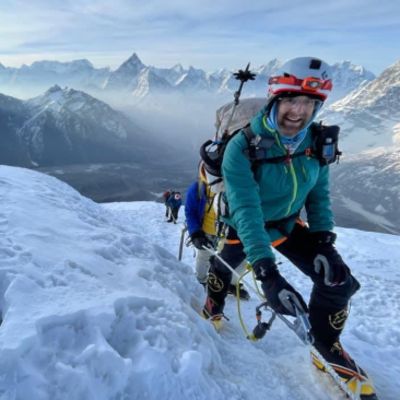
Dr. Jonathan Reuel Sugarman
A man of the mountains; A mountain of a man
UPDATE:
Dr. Jonathan R. Sugarman | Celebration of Life
Thursday, August 24
5pm
Seattle Mountaineers Program Center
7700 Sand Point Way NE, Seattle, WA 98115
tinyurl.com/jonathanaug24
Dress Code: Come As You Are (no need for suits/black attire)
-------
Jonathan R. Sugarman, M.D., M.P.H. of Seattle passed away on May 1, 2023 in Nepal while on an expedition to climb Mt. Everest. Jonathan was a highly experienced and passionate climber who succumbed to the probable sudden onset of an altitude-related illness at Camp 2.
Jonathan was a man of many talents and an exceptional humanitarian who touched and changed for the better lives from the deserts of the Navajo Nation to isolated villages in Alaska to the streets of Seattle. Amidst a full and fruitful life, he was devoted to his wife Terese and their daughter Maya.
Jonathan was born in Atlanta, Georgia, the third of four sons of Dr. Nathan Sugarman, a Professor of Chemical Engineering at Georgia Institute of Technology, and Esther Goldstein Sugarman, both of Georgia. Jonathan was an accomplished athlete and musician in high school in Needham, Massachusetts but an even better student. He was admitted to Harvard College, where for one year he lived off-campus with several housemates and a pet boa constrictor. He graduated as a member of the Class of 1976.
Jonathan attended the Albert Einstein College of Medicine, where it was expected that he would follow his academic mentors and begin a career in neuroscience research. Instead, upon graduation in 1981, Jonathan startled those who knew him by turning away from research and choosing to pursue a family practice medicine residency through the University of Washington in Seattle. He later added a Master of Public Health.
At the University of Washington, Jonathan began a life committed to improving the health of hundreds of thousands of people, including and especially Native Americans, through medicine, leadership, and teaching.
Jonathan’s early medical work in Alaska and in the Northwest led to what was intended to be a short-term appointment in Shiprock, New Mexico with the Indian Health Service and the Navajo Nation. “Short-term” turned into seven happy years where Jonathan advanced to director of the medical center, married the love of his life, and became a father.
He and Terese explored the many treasures of the Southwest in a beat-up Jeep Wagoneer with little Maya bouncing in her baby carrier as they hiked the trails. When asked how hard it was to move after so many years, Jonathan expressed that “leaving the desert becomes like leaving the ocean to someone on the coast. The peacefulness and the expanse become a part of you.”
Back in Seattle in 1991 and still with the Indian Health Service, Jonathan’s interests broadened into epidemiology, a branch of medicine where he could achieve results for large groups of people. For almost two decades, he was President and CEO of Qualis Health, one of the nation’s leading non-profit population health management organizations. He continued to practice one night a week as a physician with the Seattle Indian Health Board where he became the founding Site Director for a unique Family Medicine Residency program for Native American physicians.
Jonathan authored over 90 papers and book chapters on topics such as diabetes mellitus, health problems of American Indians, and quality of care among Medicare beneficiaries. He served as a leader in a number of professional organizations, including as President of the American Health Quality Association, President of the Washington Academy of Family Physicians, Chair of the American Academy of Family Physicians Commission on Quality, and as a member of Executive Committee of the American Medical Association–convened Physician Consortium for Performance Improvement.
Jonathan’s friends note that he “failed” retirement at least once. In recent years, he was the CEO of Global to Local, a Seattle-based nonprofit whose mission is to advance health equity and improve health in U.S. communities through application of best practices from around the world. In addition, he was a Clinical Professor of Global Health and Family Practice at the University of Washington. He was on the board of the nonprofit Swedish Health System.
During the COVID pandemic, Jonathan volunteered to help administer vaccination programs to the Seattle homeless community. Never one to sit still, he maintained a rigorous training regime for his yearly climbing trips. After forty years, he picked up his trumpet and joined both a local jazz band and a community concert band.
In 2010, Jonathan had a rare father-daughter opportunity to climb Mt. Kilimanjaro, the Roof of Africa, alongside a college roommate and his son. This success rekindled Jonathan’s passion for climbing. He went on to climb the tallest mountains in North and South America and undertake three major expeditions in the Himalayas. In every climbing party, he was the steady voice, administering equal measures of advice for health and life.
Rarely demonstrative, Jonathan was always practical with a dose of good spirits and playful humor to accompany his wisdom. Dr. Sugarman changed lives and health care systems using his familiar warmth, humility, and integrity. He did so with a love for humanity and a desire to live every day to its fullest.
Along with his wife Terese Sullivan, Jonathan is survived by his daughter Maya Sugarman of Pasadena, California and three brothers, Irwin Sugarman of Sante Fe, New Mexico, Alan Sugarman of New York City (both attorneys), and Dr. Stanley Sugarman of Ridgefield, Washington. Jonathan, through his love and support of family was a brother and uncle to Terese’s three brothers, two sisters, their spouses, and their children.
Online condolences, stories, memories, and photos may be shared on: https://tinyurl.com/jonathansugarman
Gifts in memory of Dr. Sugarman may be made to a cause that deeply moved him---the Juniper Fund (https://www.thejuniperfund.org/). “The mission of the Juniper Fund is to support and empower families and communities impacted by the loss of Himalayan high-altitude workers.”
